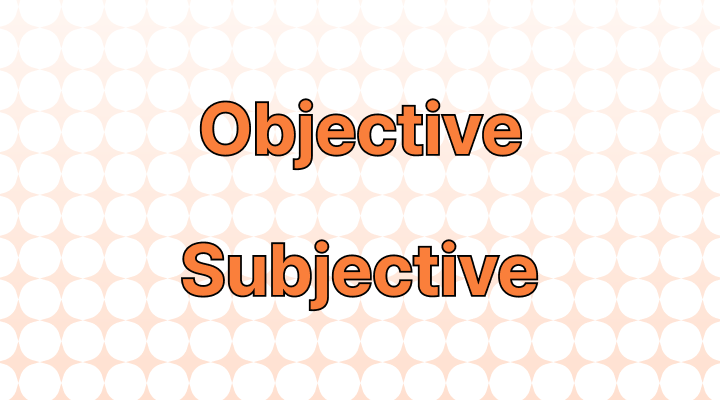Objective refers to information or perspectives that are based on verifiable facts. In contrast, subjective involves personal viewpoints, emotions, and interpretations.
While in a conversation, the words objective or subjective usually comes up when describing an observation or an opinion. But, what is the difference between both, and how does one go about correctly using them in conversations and written work?
Examples of objective sources of information
- Information in scientific journal
- Government data
- Dictionaries
- Encyclopedias
Example of subjective sources of information
- Social media posts
- Blogposts
- Personal emails
- Diaries
What is an objective viewpoint?
Objective refers to facts, and an objective viewpoint means an opinion based on factual evidence, emphasizing neutrality and detachment. Objective observations are quantifiable and consistent across observers.
Example sentence
- The journalist reported the events of the protest from an objective viewpoint, presenting facts and avoiding personal opinions.
In this sentence, "objective viewpoint" refers to the perspective of the journalist. The journalist's goal was to provide an accurate account of the protest's events, allowing readers to form their own judgments based on the presented facts. This usage of "objective viewpoint" emphasizes the journalist's commitment to fairness and accuracy in their reporting.
What is a subjective viewpoint?
Subjective viewpoint refers to an individual's personal perspective, opinions, feelings, and interpretations of a particular situation, event, or topic. It is inherently influenced by a person's unique experiences, beliefs, values, emotions, and biases.
Example sentence
- Her subjective viewpoint on the matter was evident when she passionately argued for the importance of preserving historic buildings in the city.
In this example, "subjective viewpoint" is used to describe the individual's personal perspective or opinion regarding the importance of preserving historic buildings.
The sentence suggests that the person's viewpoint is influenced by their personal feelings, beliefs, or values, and it is not necessarily an objective or universally shared viewpoint. The use of "subjective viewpoint" emphasizes that the person's perspective is based on their subjective experiences and biases, making it clear that their opinion may not represent a universally accepted or objective stance on the matter.
What is objective vs. subjective writing?
When writing objectively, one should stick to verifiable facts. For example, a scientist would write the experiment's evidence in an objective manner.
When writing subjectively, one should explain their interpretation of the material. For example, a film critic review of the new film "Barbie" should include their opinion on the film.

Practice Questions
- The journalist strived to maintain an objective/subjective perspective, while reporting on the political rally.
- Scientific experiments aim to produce objective/subjective data that can be analyzed without bias.
- Her subjective/objective interpretation of the painting differed significantly from that of the art critic.
- Objective/subjective criteria such as test scores were used to assess the candidates' qualifications for the job.
- When reviewing a movie, it's important to balance objective/subjective analysis with your subjective enjoyment of the film.
- Her subjective/objective experience of the movie was that it was a heartwarming and emotional masterpiece, but others might have a different opinion.
- The teacher encouraged students to provide objective/subjective feedback on their classmates' presentations.
- Writing a research paper requires presenting objective/subjective facts and avoiding personal opinions.
- His subjective/objective feelings of anxiety made it difficult for him to maintain an objective perspective during the debate.
- The CEO's subjective/objective belief in the company's future success influenced her objective decisions about investments.
Discover more about the AI English proofreader, Engram!

Answer key
- objective
- objective
- subjective
- objective
- objective
- subjective
- objective
- objective
- subjective
- subjective
Reference















